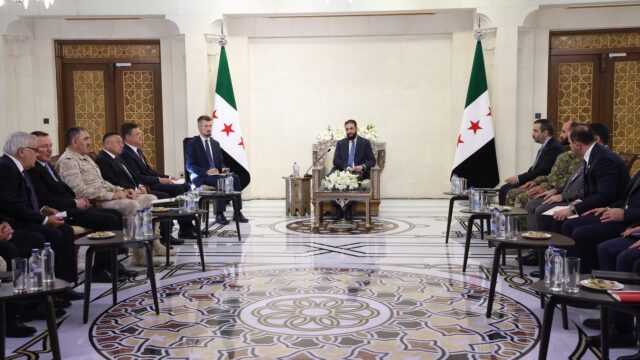
Russia Aims to Open a ‘New Page’ with Post-Assad Syria
Publication: Eurasia Daily Monitor Volume: 22 Issue: 132
By:

Executive Summary:
- On September 9, a high-level Russian delegation, led by Deputy Prime Minister Alexander Novak, paid an unannounced visit to Damascus and held talks with Syrian Foreign Minister Asaad al-Shibani.
- The talks focused on energy, military basing, and reconstruction, with Damascus demanding cheaper fuel and technical aid, while Russia wants to maintain access to the Tartus naval base and Hmeimim air base in south-east Syria.
- Moscow intends to reset ties with Syria’s new leadership after last year’s ouster of President Bashar al-Assad, one of Russia’s strongest regional allies.
On September 9, Russia dispatched a large, unannounced delegation to Syria, led by Deputy Prime Minister Alexander Novak, Russian President Vladimir Putin’s top energy strategist, in its most visible effort to recalibrate relations with the post-Assad government. The delegation included other senior figures, such as Special Envoy Alexander Lavrentiev, Deputy Defense Minister Yunus-Bek Yevkurov, and Deputy Foreign Minister Sergei Vershinin. They were welcomed by the Secretary-General to the Syrian Presidency, Maher al-Sharaa (Government of Russia, September 9). Novak framed the visit as an attempt to “open a new page” and expand cooperation in energy, defense, politics, and reconstruction. At the same time, Shibani emphasized that ties must now be “based on respect” and designed to enable Syrians to “build their future.” He also highlighted the upcoming Russia-Arab summit in Moscow, scheduled for October 15, where Syrian President Ahmed al-Sharaa’s participation is meant to symbolize a strategic reset in relations with Russia after the ouster of his predecessor and Russian ally, Bashar al-Assad, last December (The Moscow Times, September 9).
Shibani acknowledged the historical depth of ties with Russia but underlined the need for balance. He warned that any foreign presence must genuinely serve Syrian reconstruction and not perpetuate control. He noted that Damascus and Moscow are capable of forging ties “based on sovereignty, justice, and shared interests,” adding that Russia’s explicit endorsement of Syria’s new political path would be “a step in favor of Syria and the entire region” (Asharq Al-Awsat, September 10).
Energy cooperation remains the cornerstone of the Russian–Syrian relationship, although its terms are now being contested. Syria’s energy sector, shattered by 13 years of conflict, is dependent on imports, with urgent needs for diesel, fuel oil, and equipment to revive oil and gas production (TASS, September 9). Novak confirmed that Russia, as well as Qatar, were exploring options to support Syria’s energy and humanitarian needs (North Press Agency, September 9). Syrian officials, however, expect tangible concessions, including subsidized fuel, the return of Russian technicians, and reconstruction assistance, in exchange for guarantees on Moscow’s continued access to its military bases in Syria’s south-east, Tartus and Hmeimim. Russian sources acknowledged that Damascus pressed for virtually free fuel supplies as part of the bargain. A once-unilateral arrangement—where bases and contracts flowed easily to Moscow—is now becoming transactional, with the Syrian side demanding visible returns. This signals a shift in leverage and a broader Syrian attempt to redefine the framework of cooperation (The New Arab, September 10).
Military issues remain central but equally fraught. Although Novak avoided public reference to Russia’s bases, discussions likely touched on the future of Tartus and Hmeimim, training and rehabilitation for Syrian forces, and possible arms supplies carefully calibrated to avoid direct clashes with Israel (TASS, September 9). Damascus is considering the resumption of Russian military police patrols in southern Syria to deter Israeli raids, while at the same time reviewing older agreements it regards as unfair. Shibani stressed that Syria is closing the chapter on chemical weapons by cooperating with the Organization for the Prohibition of Chemical Weapons (OPCW), a clear effort to distance the new leadership from Assad’s legacy while signaling openness to conditional international re-engagement (SANA, September 9). For Moscow, the challenge is to secure its military assets without being seen as obstructing Syria’s sovereignty or provoking further Israeli escalation.
Israel’s shadow loomed large over the visit. Just a day before the Russian delegation’s arrival, Israeli jets struck Syrian targets, underscoring the vulnerability of Damascus (The Times of Israel, September 9). Novak proposed leveraging Russia’s “unique negotiating capabilities,” built on its contacts with Israel and diverse Syrian communities, to act as a stabilizer. He openly condemned Israel’s “destructive” actions and suggested that Moscow could serve as a mediator to reduce tensions (The New Arab, September 10). For Syria, Russia’s possible role in negotiating with Israel is open for debate. There are questions over whether Russia still has enough influence to constrain Israel’s freedom of action, or if Moscow’s promises will amount to little more than rhetoric. For Moscow, positioning itself as an intermediary offers a means to reinforce its regional role, particularly as it seeks to counterbalance the West’s influence in the Middle East.
The Russian delegation’s surprising visit to Damascus underscored both continuity and change in Russian-Syrian relations. Moscow remains committed to protecting its military foothold, securing energy and reconstruction contracts, and leveraging its diplomatic ties with Israel to stay relevant. Damascus, however, is no longer willing to accept the terms of near-total dependency that defined the Assad era. By pressing for cheaper fuel, greater technical support, and a rebalanced military framework, the new Syrian leadership is signaling a more transactional, sovereignty-conscious approach. The dynamic is evolving into a negotiation between two sides with overlapping interests but increasingly divergent expectations. Russia aims to prevent recalibration from turning into estrangement, while Syria hopes to extract resources and security guarantees without reverting to the clientelism of the past. The visit, therefore, was not just ceremonial; it was a test of whether Moscow and Damascus can redefine their partnership to fit the realities of a post-Assad order, one where Russia still maintains a significant role but is no longer untouchable.



